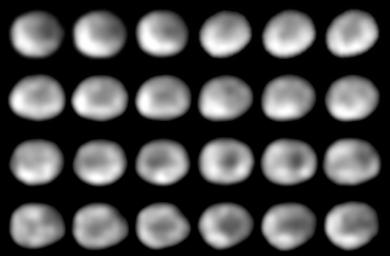
|
Asteroid or Mini-Planet? Hubble Maps the Ancient Surface of Vesta
- Click the image above for a larger view
- Full-Res JPEG (800 x 525) (27.1 kB)
- Full-Res TIFF (800 x 525) (420.6 kB)
Caption:
This is a NASA Hubble Space Telescope series of 24 images showing the full 5.34-hour rotation of the 325-mile diameter (525 kilometer) asteroid Vesta.
Hubble resolves features as small as 50 miles across, allowing astronomers to map Vesta's geologically diverse terrain. The surface is a complex record of Vesta's four billion-year history. Features include ancient lava flows, and a gigantic impact basin that is so deep, it exposes the asteroid's subsurface, or mantle.
This sequence was taken with Hubble's Wide Field Planetary Camera 2 between November 28 and December 1, 1994, when Vesta was at a distance of 156 million miles from Earth.
When combined with ground-based data, astronomers will be able to make the first geochemical map of Vesta's surface.
Background Info:
More information about asteroid Vesta is online at http://www.nasa.gov/dawn and http://dawn.jpl.nasa.gov .
Cataloging Keywords:
| Name | Value | Additional Values |
|---|---|---|
| Target | 4 Vesta | |
| System | Main Belt | |
| Target Type | Asteroid | |
| Mission | Hubble Space Telescope (HST) | |
| Instrument Host | Hubble Space Telescope | |
| Host Type | Space Telescope | |
| Instrument | Wide Field/Planetary Camera 2 (WFPC2) | |
| Detector | ||
| Extra Keywords | Grayscale, Impact, Infrared, Map, Rotation, Visual | |
| Acquisition Date | ||
| Release Date | 2013-09-27 | |
| Date in Caption | 1994-12-01 | |
| Image Credit | NASA/STScI/Georgia Southern University | |
| Source | photojournal.jpl.nasa.gov/catalog/PIA17467 | |
| Identifier | PIA17467 | |
